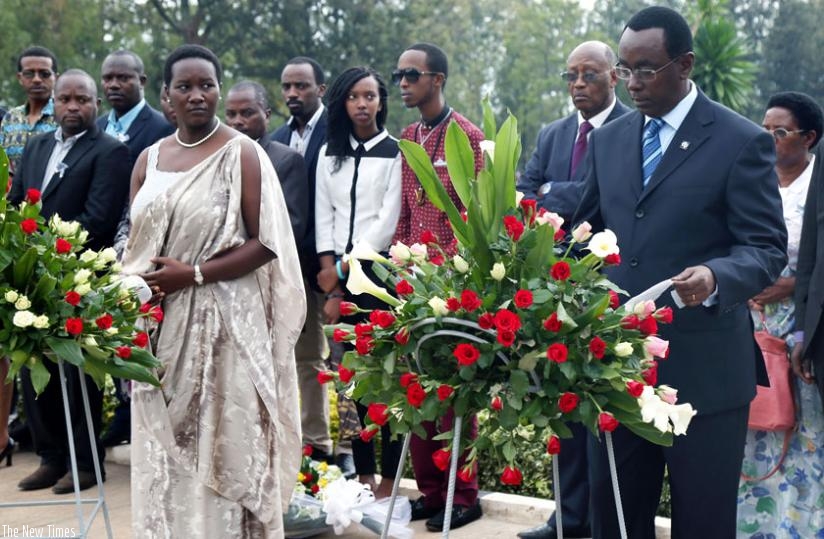Families of politicians who were killed during the 1994 Genocide against the Tutsi as well as the country’s top dignitaries flocked to Rebero Genocide Memorial Centre in Kicukiro District, yesterday, where they laid wreaths on tombs where the former politicians are buried.


Families of politicians who were killed during the 1994 Genocide against the Tutsi as well as the country’s top dignitaries flocked to Rebero Genocide Memorial Centre in Kicukiro District, yesterday, where they laid wreaths on tombs where the former politicians are buried.
Politicians buried at Rebero include Landouard Ndasingwa, aka Lando, Venantie Kabageni, Charles Kayiranga, André Kameya, Aloys Niyoyita, Augustin Rwayitare, and Jean de la Croix Rutaremara.
Others include Joseph Kavaruganda, Frederic Nzamurambaho, Felicien Ngango, Jean Baptiste Mushimiyimana, and Faustin Rucogoza.
All of the politicians, many of who were members of either the Liberal Party (PL) or the Social Democratic Party (PSD), were reformists who called for peace and reconciliation, pushed for dialogue, and condemned the hate ideology that was being promoted by the regime of President Juvenal Habyarimana.
The mourners at Rebero were led by Senate President Bernard Makuza. The ceremony was attended by top government officials and diplomats accredited to Rwanda.
According to the Spokesperson of the National Consultative Forum of Political Organisations (NFPO) in Rwanda, Alphonse Kayiranga Mukama, the politicians exemplified progressive and patriotic leadership.
"We would like to thank the government for setting up a day to remember the politicians who succumbed to the Genocide. Today we are again reminded that bonafide politicians are those who love their country,” Mukama said in an interview shortly after the event.
Solemn moment
Quietly mourning their relatives, the families of the politicians laid wreaths on tombs, many of them lifting the wreaths together before laying them.
Shortly after laying a wreath on her brother’s tomb, Lando’s sister, Anne Marie Kantengwa, told The New Times that she has the government to thank for ensuring that many Rwandans take part in the commemoration period.
"It keeps me warm knowing that I am not alone in remembering our relatives; I thank the government for teaching people to remember together those who succumbed to the Genocide,” she said.
Kantengwa also said Rwandans need to understand that they are more Rwandan than they are Hutu or Tutsi if they are to live a world free of genocide.
"Being Rwandan is more important than being Tutsi or Hutu. We should allow the ‘Ndi Umunyarwanda’ programme to help us all,” she said.
Ndi Umunyarwanda is a unity-building initiative whereby Rwandans in their communities openly talk about their history in order to heal through telling the truth, repenting, and forgiving.
Although the official mourning days ended, yesterday, commemoration activities will continue until July 4 when Rwandans mark Liberation Day.
The Executive Secretary of the National Commission for the Fight against Genocide (CNLG), Dr Jean Damascène Bizimana, urged Rwandans to allow their neighbours in communities to calmly continue mourning their relatives who died at different dates from April 7 up to July 4 in 1994.
"As commemoration activities continue, we have to keep fighting against Genocide denial and any other violence against Genocide survivors,” Bizimana told journalists yesterday.
editorial@newtimes.co.rw


